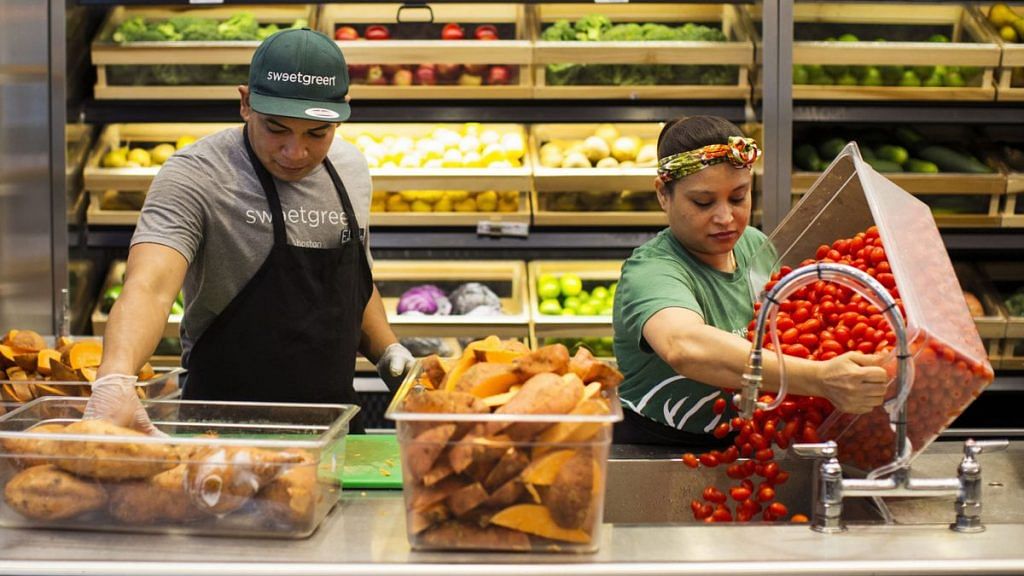Bengaluru: Go green, turn vegan: That’s the UN climate science body’s advice to the world after a new study threw up stomach-churning predictions about a looming food crisis.
The window to stave off the imminent threat of food supplies running out is closing very soon, and humanity needs to do something, the Intergovernmental Panel on Climate Change (IPCC) has said.
The new special report of the IPCC on climate change and land use states that land and water resources are being used at an alarming rate to cater to a growing human population, endangering food supply around the world.
Prepared by 107 experts from 52 countries, the report calls it an “unprecedented exploitation” of Earth’s natural resources.
The report was released this week as a summary at a meeting in Geneva, where IPCC is based.
The authors examined over 7,000 studies over about three years to assess the links between climate change, food security, land degradation and desertification.
Also read: We need climate-friendly cows, and scientists have a suggestion on how to create them
The food disparity
Half a billion people now live in places that are slowly turning into dry, non-arable deserts. The report states that soil for agriculture is being lost between 10 and 100 times the rate at which it is being formed.
It warns that food shortages will increase cross-border migration, as well as the frequency of extreme-weather calamities such as floods and droughts, which the report predicts could escalate geopolitical tensions.
Low- and middle-income countries, according to the report, will disproportionately bear the brunt of this consequence.
Among other things, the report refers to the increasing disparity between those who have food access and those who don’t: Approximately 2 billion adults are overweight or obese while nearly a billion are undernourished.
“Food security will be increasingly affected by future climate change through yield declines — especially in the tropics — increased prices, reduced nutrient quality, and supply chain disruptions,” said author Priyadarshi Shukla in a statement.
“We will see different effects in different countries, but there will be more drastic impacts on low-income countries in Africa, Asia, Latin America and the Caribbean,” Shukla added.
Increased emissions, the report noted, also decrease the nutritive value of food.
The average global temperature has already risen by 1.1°C, while land masses have warmed up by 1.8 degrees over the past 140 years. The oceans are yet to reach this limit.
The Paris Agreement goals state that human-induced global warming in the 21st century should be restricted to a two-degree rise over pre-industrial times (the late 1800s). Scientists have predicted disastrous consequences for the world even if the goal is kept, advising nations to attempt the more ambitious target of 1.5°C.
Note that the warming numbers given by IPCC are up to the mean over 2006-2015, not up to the present. If you remove interannual noise by a low-pass filter (or just eyeballing) you see that land areas have warmed about 1.8 °C until today, and global mean temperature by 1.1 °C. https://t.co/huSZTUZU4H
— Stefan Rahmstorf ? (@rahmstorf) August 8, 2019
Agriculture, meat, and emissions
In a vicious cycle, as the climate crisis affects agriculture, agriculture affects the climate as well.
Loss of forests and wetlands, like in Indonesia and Malaysia for palm oil production, has the potential to release hundreds of billion tonnes of carbon dioxide into the atmosphere.
Another major offender is the meat and dairy industry, which reportedly competes with the automobile sector as far as emissions go, and reportedly accounts for 83 per cent of farmland use and produces 60 per cent of agriculture’s greenhouse gas emissions.
Nearly a quarter of greenhouse emissions come from land usage.
Referring to the Paris Agreement’s goal of restricting warming to under 2 degrees above preindustrial temperatures, the IPCC says, “..Keeping global warming to well below 2 degrees Celsius can be achieved only by reducing greenhouse gas emissions from all sectors including land and food.”
The report also dwells on possible solutions to address these threats, and for making food production and consumption more efficient.
Apart from an advice to switch to a plant-based vegan diet, the report encourages awareness about rampant global food wastage, better soil management and crop diversification, less intensive-farming practices, land restoration, and an improvement in systems that distribute food.
Other advice stresses reduction of land emissions through restoring ecosystems such as grasslands, peatlands, mangroves, and wetlands, which act as effective carbon sinks.
An ISRO analysis of remotely-sensed data in 2016 had revealed that 96.40 million hectares or 29.32 per cent of the Total Geographic Area (TGA) of India faces the threat of degradation, which essentially refers to any undesirable change to a piece of land.
The Modi government is planning an intensified effort to address land degradation, with India also set to host the UN Convention to Combat Desertification next month.
Also read: Militant vegans in France are using extreme tactics to stop meat-eating
